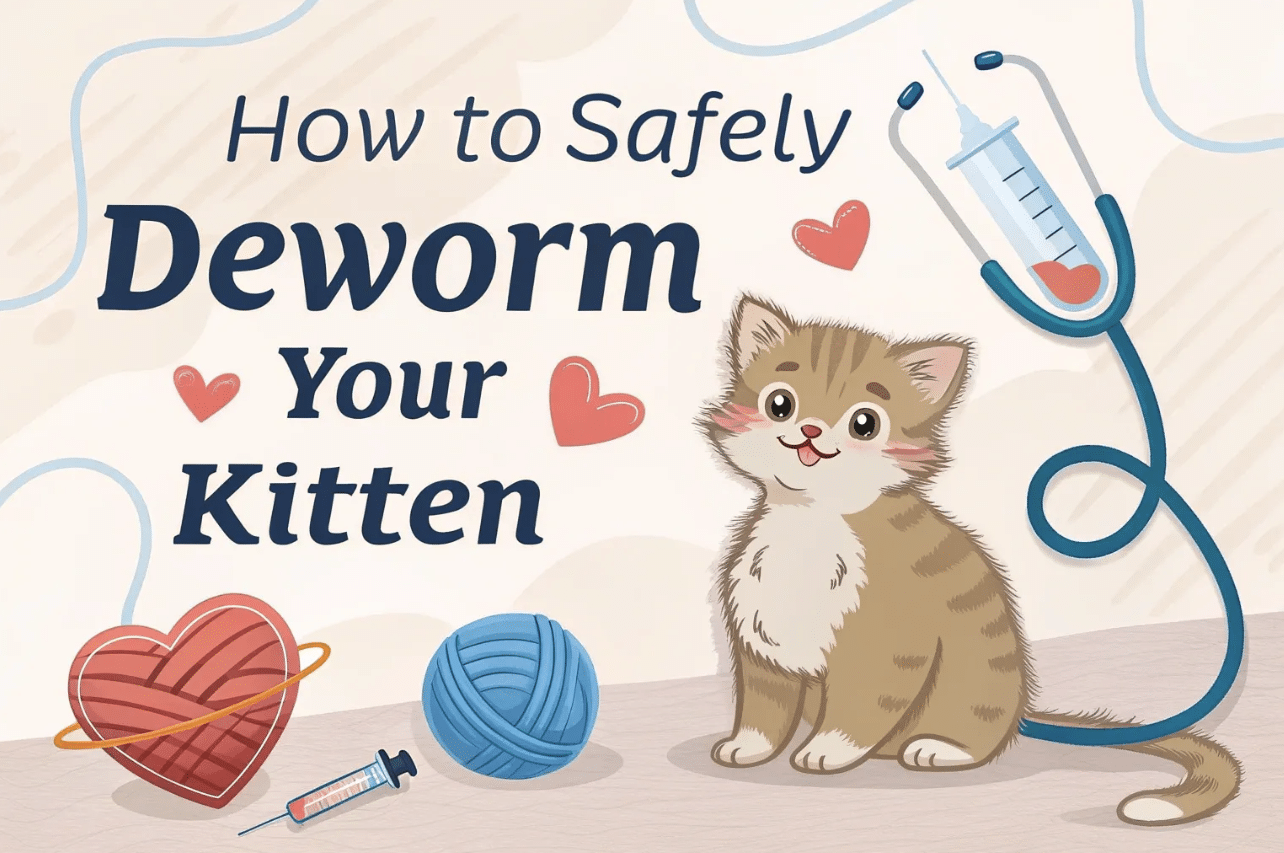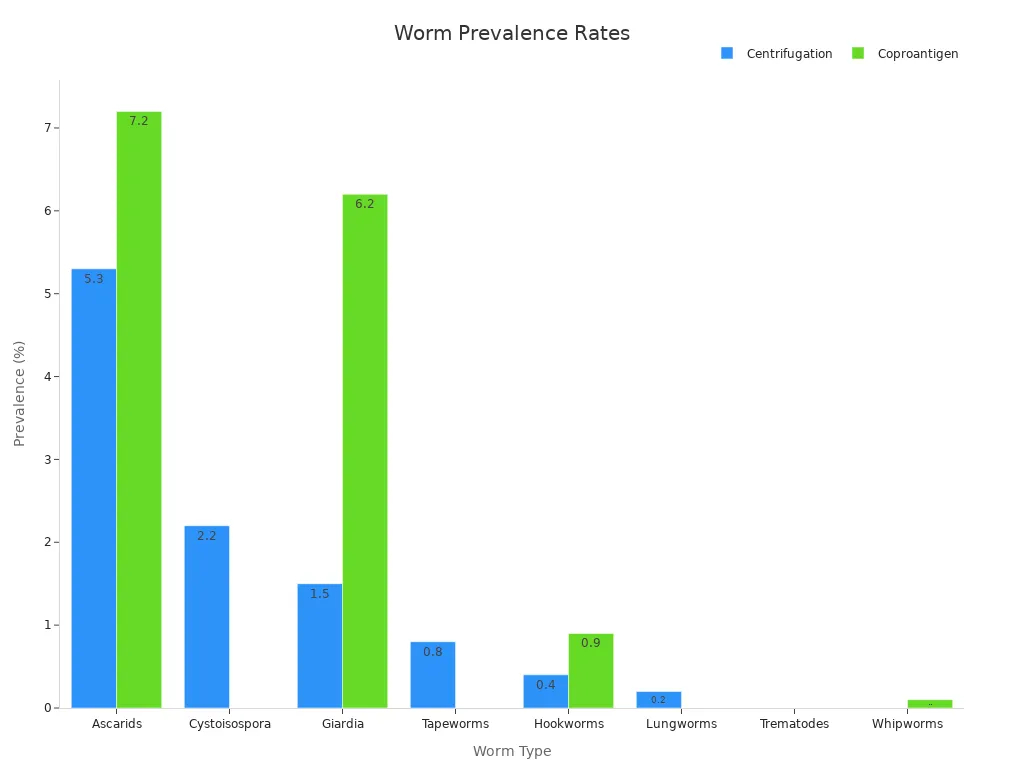
Deworming is essential for maintaining your kitten’s health, particularly when addressing the treatment of kitten worms. Parasitic worms can adversely affect kittens by impairing growth and causing malnutrition. It is advisable to act promptly to safeguard your kitten from these potential hazards.
Regular deworming routines help prevent health issues and support overall wellness. Common parasites like roundworms and tapeworms are often found in kittens. Learning how to treat kitten worms at home allows for effective care of your pet. With the right methods, you can safely eliminate worms and keep your kitten protected from parasitic infections.
Types of Worms in Kittens and How to Treat Them
Spotting Roundworms in Kittens
Roundworms are very common in kittens. These worms, like Toxascaris leonina and Toxocara cati, can infect many young cats. They live in the intestines and may cause slow growth, a swollen belly, or diarrhea. You might see spaghetti-like worms in your kitten’s poop or vomit.
To find roundworms, check your kitten’s stool with a microscope or ask a vet. It’s important to act quickly because roundworms can infect humans, too.
Medicines like pyrantel pamoate are effective in treating them. Always follow the instructions to give the right dose.
Finding Tapeworms and Their Signs
Tapeworms are another type of worm that kittens can get. These worms stick to the intestines and take nutrients. Unlike roundworms, tapeworms often don’t cause clear symptoms. But you might see tiny, rice-like pieces near your kitten’s bottom or in their poop.
Kittens usually get tapeworms by eating fleas that carry the larvae. Using flea treatments regularly can stop this. If your kitten has tapeworms, medicines like praziquantel can help. Follow the directions to remove the worms safely.

Understanding Hookworms and Their Effects
Hookworms are less common but still dangerous for kittens. These small worms suck blood, which can cause anemia and weakness. Signs include pale gums, weight loss, and dark, sticky poop. Hookworms can enter through the skin or be swallowed.
To treat hookworms, use medicines like fenbendazole. Make sure to give the right amount based on your kitten’s weight. Keeping your kitten’s area clean can help stop reinfection.
|
Type of Worm |
|
|---|---|
|
Ascarids |
5.3 (centrifugation), 7.2 (coproantigen) |
|
Tapeworms |
0.8 |
|
Hookworms |
0.4 (centrifugation), 0.9 (coproantigen) |
Knowing how to treat worms is key to keeping your kitten healthy. Regular deworming and prevention can protect them from these parasites.
Common Signs of Worm Infestations in Kittens
Worms can change your kitten’s health and behavior. Spotting these signs early helps stop the problem from getting worse. Below are common symptoms of worms in kittens:
-
Changes in appetite: Your kitten might eat too much or stop eating. Worms can mess with digestion and how nutrients are absorbed.
-
Weight loss: Even if your kitten eats normally, they may lose weight. Worms take away nutrients your kitten needs to grow.
-
Diarrhea or vomiting: Upset stomachs are a common sign of worms. You might see loose poop or occasional vomiting.
-
Bloated belly: A round, swollen tummy in kittens often means roundworms.
-
Lethargy: Worms can make kittens tired, so they play less or seem lazy.
Cats with heartworms may cough, struggle to breathe, or vomit. These signs usually show up about 3 months after infection when immature worms reach the lungs and die.
Some signs, like pale gums or dark poop, may mean hookworms are causing anemia. If you experience these symptoms, act promptly to prevent serious problems. Checking the stool and giving deworming medicine regularly can keep your kitten safe.
|
Symptom |
Possible Worm Type |
Severity Level |
|---|---|---|
|
Bloated belly |
Roundworms |
Moderate |
|
Pale gums |
Hookworms |
Severe |
|
Rice-like segments |
Tapeworms |
Mild |
|
Vomiting |
Heartworms |
Moderate |
Knowing these signs helps you find worm problems early. If symptoms don’t go away or get worse, talk to a vet.
How to Deworm a Kitten: Step-by-Step Guide
When to Start Deworming Your Kitten
It’s important to know when to start deworming. Many kittens are born with worms or get them soon after birth. Starting early helps stop health problems caused by parasites like roundworms and hookworms.
Experts recommend beginning deworming when kittens are 2-3 weeks old. At this age, they are at risk, and early care helps them grow strong.
The Companion Animal Parasite Council suggests a clear deworming plan. Begin at three weeks old and repeat every two weeks until they are eight weeks old. After that, give monthly treatments until they are six months old. This schedule keeps your kitten safe from worms and helps their immune system grow.
If you’re asking, “When can you deworm a kitten?” the answer is simple: start early and stick to a schedule. Weigh your kitten with a digital scale before giving medicine. Knowing their weight ensures you give the right amount, which is very important.
|
Age (weeks) |
What to Do |
|---|---|
|
2-3 |
Start deworming with pyrantel pamoate. |
|
4-6 |
Repeat treatment every two weeks. |
|
8 |
Switch to monthly treatments. |
|
6 months |
Continue monthly deworming as needed. |
Choosing the Right Cat Worm Treatment
Picking the right worm medicine is key for your kitten’s health. Not all dewormers work the same, so choose one that targets the worms your kitten has. Broad-spectrum dewormers, such as pyrantel pamoate and praziquantel, are effective against roundworms, hookworms, and tapeworms.
Check how well each treatment works on different worms. For example, pyrantel pamoate is great for roundworms and hookworms, while praziquantel is best for tapeworms. Studies show pyrantel/praziquantel combinations are 100% effective against Toxocara species and 99.1% against Ancylostoma species.
|
Treatment |
Works Against |
Success Rate (%) |
|---|---|---|
|
Pyrantel/Praziquantel |
Roundworms, Hookworms |
100 |
|
Milbemycin/Praziquantel |
Hookworms |
93.5 |
|
Bravecto® Plus (G1) |
A. abstrusus (lungworms) |
99.66 |
|
Bravecto® Plus (G2, G3) |
A. abstrusus (lungworms) |
100 |
Always read the label and ask your vet if you’re unsure about the medicine. Don’t use products made for adult cats, as they might not be safe for kittens. Look for dewormers made for kittens and follow the instructions carefully.
Administering Deworming Medication Safely
Giving deworming medicine to your kitten needs care and accuracy. First, weigh your kitten to know the right dose. Use a digital scale for precise measurements, as even slight errors can impact the treatment.
Follow these steps to make the process easy and safe:
-
Get the Medicine Ready: Measure the correct dose based on your kitten’s weight. Use a syringe or dropper for liquid medicine, as it’s easier for kittens.
-
Hold Your Kitten Securely: Gently hold your kitten to stop them from moving. Wrapping them in a soft towel can help keep them calm.
-
Give the Medicine: Place the syringe or dropper at the side of their mouth. Slowly release the medicine so they can swallow it naturally. Don’t force it to avoid choking.
-
Reward Your Kitten: Give a small treat or cuddle them after giving the medicine. This makes future treatments less stressful.
You’ll need to give more doses to fully remove worms. The first dose kills adult worms, but follow-up doses get rid of new larvae. Stick to the schedule and watch for side effects like vomiting or diarrhea.
If you’re unsure about deworming or notice side effects, talk to your vet. They can help you choose the safest and best way to care for your kitten.
Tips for a Stress-Free Deworming Process
Deworming your kitten doesn’t have to be hard. With the right steps, you can make it easy and calm. Here are some simple tips to help you and your kitten:
-
Prepare the Environment
Pick a quiet place where your kitten feels safe. Avoid loud or busy areas that might scare them. Use a familiar spot like their bed or blanket to help them relax. Keep everything you need nearby, like medicine, a syringe, and a towel. -
Stay Calm and Confident
Kittens can sense how you feel. If you’re nervous, they might get scared too. Stay calm and act confidently. Speak softly to reassure your kitten during the process. -
Use Positive Reinforcement
Reward your kitten before and after giving the medicine. Treats, petting, or playtime can help them feel good about the experience. This makes future deworming easier. -
Wrap Your Kitten Gently
Wrap your kitten in a soft towel to keep them still. This “kitten burrito” method prevents scratches and helps them feel secure. It also makes giving medicine safer. -
Administer the Medication Properly
Follow the instructions on the medicine carefully. Use a syringe for liquid medicine and aim for the side of their mouth. Release it slowly to avoid choking. For tablets, crush them and mix with wet food if needed. -
Take Breaks if Needed
If your kitten gets too stressed, stop and let them relax. Forcing the process can make it harder next time. Be patient and take your time.
Tip: Handle your kitten often to help them get used to being held. This can make deworming and other care easier.
-
Clean Up and Monitor
Clean up spills and wash your hands after giving the medicine. Watch your kitten for 24 hours to check for any bad reactions to the treatment.
Following these tips makes deworming easy and stress-free. A calm approach helps the medicine work and builds trust between you and your kitten.
Kitten Deworming Schedule and Post-Treatment Care
Recommended Deworming Schedule for Kittens
Maintaining a regular deworming schedule is crucial for a healthy kitten. Many kittens are born with worms or get them soon after birth. Starting early and staying consistent helps prevent problems from arising.
A vet-approved plan usually begins when kittens are just a few weeks old.
Here’s an easy timeline to follow:
|
Age (Weeks) |
Deworming Action |
Notes |
|---|---|---|
|
2-3 |
Begin with pyrantel pamoate. |
Targets roundworms and hookworms. |
|
4-6 |
Repeat every two weeks. |
Kills both larvae and adult worms. |
|
8 |
Start monthly treatments. |
Use broad-spectrum medicine. |
|
6 months |
Continue monthly as needed. |
Prevents reinfections. |
This plan eliminates worms at all stages of their life cycle. Wondering how often to deworm a kitten? It depends on their age and risks. For kittens under six months, follow biweekly and monthly treatments. After six months, ask your vet for the best plan.
Following this schedule protects your kitten and reduces the chance of worms spreading to others in your home.
What to Expect After Deworming
Knowing what happens after deworming helps you track your kitten’s recovery. Deworming medicine starts working right away, but you might notice some changes in your kitten during the first few days.
Here’s a general recovery timeline:
|
Day |
Clinical Signs Observed |
Recovery Status |
|---|---|---|
|
0 |
Mild symptoms like tiredness, diarrhea, or vomiting. |
Symptomatic |
|
7 |
Better appetite and more energy. |
Improved |
|
14 |
Weight gain and shinier fur. |
Fully recovered |
On the first day, your kitten may pass worms in their poop. This is normal and shows the medicine is working. Mild side effects like nausea or less appetite may happen but usually go away in 1-2 days. By the end of the first week, your kitten should eat more and have more energy. Their fur may also look healthier. Full recovery often takes about two weeks, depending on how bad the infestation was.
If you’re unsure about what’s normal or see serious symptoms like nonstop vomiting or extreme tiredness, call your vet right away.
Monitoring for Side Effects and Improvement
Watching your kitten after deworming is important to ensure they’re doing well. Look for both side effects and signs of getting better.
Common Side Effects:
-
Mild nausea or throwing up.
-
Temporary loose stools or diarrhea.
-
Eating less for a day or two.
-
Feeling tired or less active.
-
Rare allergic reactions, like swelling or trouble breathing.
These side effects are typically mild and usually resolve quickly. If they don’t or get worse, contact your vet.
Signs of Improvement:
-
More energy and playful behavior.
-
Better appetite and steady weight gain.
-
Shinier and healthier-looking fur.
Keep a daily log of your kitten’s eating, energy, poop, and overall appearance. This helps you notice problems early and gives useful info to your vet if needed.
Recovery time depends on the type of worm and the severity of the infestation. Most kittens feel better in a week, but full recovery can take up to two weeks. Regular deworming, as part of a vet-approved plan, helps stop reinfections and keeps your kitten healthy.
When to Ask a Vet for Help
Knowing when to call a vet is very important. While you can deworm at home, some cases need expert care. Acting quickly can prevent serious health issues for your kitten.
Signs That Need Immediate Vet Attention
Some symptoms that occur during or after deworming indicate that you should see a veterinarian. Look out for these warning signs:
-
Frequent Vomiting: A little vomiting after deworming is normal. However, if it occurs frequently or persists, consult a veterinarian.
-
Bloody Poop: Blood or black, sticky poop might mean worms or other problems.
-
Very Tired Kitten: If your kitten is too weak or not active, it could be anemia or dehydration.
-
Swelling or Allergies: Swollen face, trouble breathing, or drooling might mean an allergic reaction.
-
No Improvement: If your kitten doesn’t get better after treatment, ask a vet for advice.
Times You Need a Vet’s Diagnosis
Sometimes, only a vet can figure out what’s wrong. They have tools to check for worms and decide the best treatment. Here are situations where a vet is needed:
-
Worms Keep Coming Back
If your kitten keeps getting worms, a vet can identify the cause and suggest more effective prevention. -
Unknown Worms
Some worms are too small to see. A vet can test your kitten’s poop to find hidden parasites. -
Sick Kittens
If your kitten has other health problems, they may need special care. A veterinarian can ensure the treatment is safe.
|
Symptom/Condition |
Possible Cause |
What to Do |
|---|---|---|
|
Nonstop vomiting |
Bad worm infection |
Visit a vet right away |
|
Blood in poop |
Hookworms or injury |
Get urgent care |
|
Worms keep returning |
Reinfection or resistance |
Ask for vet diagnosis |
|
Allergic reaction |
Medicine sensitivity |
Emergency vet visit |
Getting Ready for the Vet
When you go to the vet, bring helpful information. This makes it easier for them to treat your kitten. Here’s what to prepare:
-
Poop Sample: Collect fresh poop in a clean container for testing.
-
Health Records: Share your kitten’s deworming history and any symptoms.
-
Kitten’s Weight: Bring their latest weight to ensure the right medicine dose.
Following Up with the Vet
Even after deworming, you might need follow-up visits. Check with your vet if:
-
New symptoms appear after treatment.
-
You still see worms in the poop weeks later.
-
The vet suggests more tests or medicine.
Regular vet visits keep your kitten healthy. Acting fast when problems arise helps your kitten grow strong and happy.
Preventing Worms in Kittens
Why Cleanliness Helps Stop Worms
Keeping things clean protects kittens from worms. Parasites spread in dirty places. Wash your kitten’s bedding, toys, and bowls often. Use warm, soapy water to clean them. Vacuum floors and carpets to remove hidden eggs or larvae.
Clean the litter box every day. Worm eggs can live there if left too long. Use disinfectant to kill any parasites. Always wash your hands after touching your kitten or cleaning their litter box. This keeps worms from spreading to pets or people.
Flea Control to Stop Worms
Fleas can cause tapeworms in kittens. When kittens eat fleas while grooming, they might get tapeworms. Use flea medicine approved by vets to stop fleas. Check your kitten’s fur for fleas or black specks often.
Clean your home to remove fleas. Wash bedding in hot water and vacuum floors regularly. Treat all pets in your home with flea prevention. Stopping fleas helps prevent worms and keeps your kitten healthy.
Keeping Kittens Safe Outdoors
Going outside can expose kittens to worms. Worms come from rodents, stray cats, or dirty soil. Follow these tips to protect your kitten:
-
Use a leash to watch them outside.
-
Build a safe outdoor space to limit contact with animals.
-
Avoid areas with stray cats or rodents.
-
Use flea and tick medicine regularly.
These steps keep your kitten safe from parasites outside. Protecting them outdoors is as important as keeping their indoor space clean.
Keeping a Deworming Routine for Your Kitten
A regular deworming routine is very important for your kitten’s health. Without a proper plan, worms can come back and cause problems. Sticking to a schedule keeps your kitten safe from parasites as they grow.
Why Following a Schedule is Important
Worms grow and spread fast. Skipping a dose of medicine lets worms multiply, which can harm your kitten. Regular deworming stops worms from growing and spreading. It also protects other pets and people in your home from getting infected.
Steps to Make and Follow a Deworming Plan
Here’s how to keep your kitten on track with deworming:
-
Start Early
Begin deworming when your kitten is 2-3 weeks old. Early care helps protect them when they are most at risk. -
Set Reminders
Use a calendar or phone app to remember deworming dates. Write down the next dose right after giving the current one. -
Follow the Right Timing
Deworm kittens every two weeks until they are 8 weeks old. After that, switch to monthly treatments until they are 6 months old. Adult cats usually need deworming every 3 months. -
Ask Your Vet
Talk to your vet about the best plan for your kitten. Things like where you live and other animals around may change how often deworming is needed.
|
Age (Weeks) |
Deworming Frequency |
Notes |
|---|---|---|
|
2-8 |
Every 2 weeks |
Stops early worm problems. |
|
8-24 |
Monthly |
Prevents worms from returning. |
|
24+ |
Every 3 months |
Keeps long-term protection. |
Tip: Write down all deworming treatments in a notebook. This helps you stay organized and avoid missing doses.
Staying on Track
Being consistent is the best way to fight worms. Even if your kitten looks healthy, stick to the plan. Worms can hide without showing signs. Regular deworming keeps your kitten healthy and helps them grow strong.
Deworming is important to keep your kitten healthy and safe. It helps your kitten grow strong and avoids problems caused by worms. Sticking to a schedule and keeping their space clean reduces the likelihood of worms returning. Taking steps like controlling fleas and being cautious outdoors also helps prevent future infestations.
Skipping deworming can lead to poor growth, a lack of nutrients, or serious health problems. Always ask a vet to create a plan that fits your kitten’s needs.
FAQ
How can I tell if my kitten needs deworming?
Look for signs like bloated belly, diarrhea, or rice-like segments in poop. Changes in appetite or energy levels may also indicate worms. Regular stool checks help detect infestations early.
Can I use dog deworming medicine for my kitten?
No, dog dewormers may harm kittens. Always choose medicines labeled for cats or kittens. Consult your vet to ensure the treatment is safe and effective.
What should I do if my kitten refuses the medication?
Mix liquid medicine with wet food or use a syringe for direct administration. Wrap your kitten in a towel to keep them calm. Reward them afterward to make the process easier.
Is it safe to deworm a sick kitten?
Avoid deworming if your kitten is unwell. Worm medicine can stress their body further. Speak to your vet for advice on treating worms in sick kittens.
How often should I deworm my kitten?
Start at 2-3 weeks old and repeat every two weeks until 8 weeks. Switch to monthly treatments until 6 months. Adult cats need deworming every three months.

In her previous life, Lisa traveled extensively, both for work and leisure. After the pandemic struck, Lisa locked up her luggage and adopted a cat ever since.
Lisa is now an avid cat lover, she devotes most of her free time serving as butler to her adorable feline at home. When she is not with her cat, she can be seen using her phone sourcing for the latest cat supplies online.


